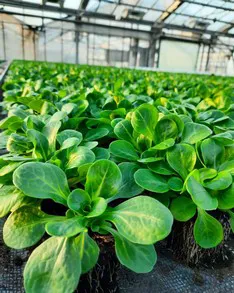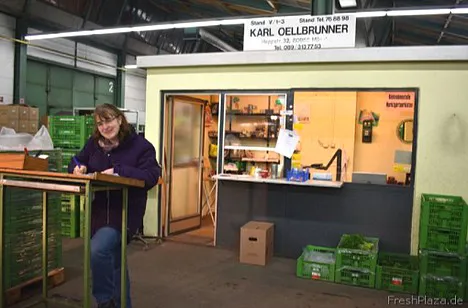The lamb's lettuce season is well into its second half already. The domestically grown winter leafy vegetable will be marketed until about Easter, before summer lettuces come to the fore. "The marketing of lamb's lettuce has not presented any problems so far. A major factor of uncertainty are rising energy prices for greenhouse produce. Since the volumes of lamb's lettuce are usually not enough to meet demand, we have been able to get our asking prices accepted to some extent so far," says Christine Biedermann, a grower and direct marketer at the Munich Gardeners' Hall.
 In terms of volume, greenhouse field lettuce tends to be a smaller product at the traditional Munich company. The greenhouse is heated accordingly using heating oil, she says. "Compared to some competitors, our product is considerably smaller than the conventional, standard lamb's lettuce on the market, but this makes for a unique sales proposition in marketing terms," Biedermann said. The lamb's lettuce is marketed until Easter, after which open field lettuces come to the fore. "You could theoretically sell lamb's lettuce throughout the summer, yet it would be considerably more difficult to offer the marketable quality during the summer months."
In terms of volume, greenhouse field lettuce tends to be a smaller product at the traditional Munich company. The greenhouse is heated accordingly using heating oil, she says. "Compared to some competitors, our product is considerably smaller than the conventional, standard lamb's lettuce on the market, but this makes for a unique sales proposition in marketing terms," Biedermann said. The lamb's lettuce is marketed until Easter, after which open field lettuces come to the fore. "You could theoretically sell lamb's lettuce throughout the summer, yet it would be considerably more difficult to offer the marketable quality during the summer months."
Lettuces of all kinds have been the company's core competence for many years. Biedermann: "In general, butterhead lettuce is the best-selling product, with the catering trade focusing very strongly on mixed salads. In the specialist retail trade, for example, a new type of lettuce such as Novita is well received, while the lollo varieties are less in demand. We've also been devoting more time to growing new varieties for about two years, although the tried-and-true varieties are taken the most in terms of volume."

Christine Biedermann during Freshplaza's 2017 wholesale market visit.
Security of supply in times of crisis
For many years now, the Oellbrunner grower has been based in the growers' hall at Munich's wholesale market. Even in times of crisis, the company's own vegetables quickly find their way to the respective buyer, Biedermann notes with satisfaction. "Fortunately, we serve a diversified clientele consisting of market stockers, specialty retailers and catering suppliers. While the latter sales channel has slowed, we've been able to sell more in other areas."
Similar to many other long-established businesses at the local wholesale market, a succession plan is not in place at the Oellbrunner facility, she said. "Our children don't want to continue their parents' business because they see us working 14-hour days and hardly ever being able to go on vacation. This physically hard work, which we do every day for the benefit of the supply security, is unfortunately often undervalued in society as well."
For more information:
Christine Biedermann
Gärtnerei Oellbrunner
Großmarkt München
Tel.: +49 89 3137753
gaertnerei.oellbrunner@gmail.com
instagram.com/gaertnerei_oellbrunner
